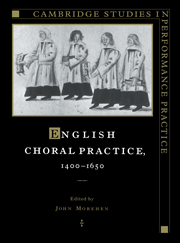Book contents
- Frontmatter
- Contents
- List of plates
- General preface
- Preface
- Abbreviations
- 1 To chorus from quartet: the performing resource for English church polyphony, c. 1390–1559
- 2 Editing and performing musica speculativa
- 3 The sound of Latin in England before and after the Reformation
- 4 English pronunciation, c. 1500 – c. 1625
- 5 Byrd, Tallis and Ferrabosco
- 6 John Baldwin and changing concepts of text underlay
- 7 Sacred songs in the chamber
- 8 The education of choristers in England during the sixteenth century
- 9 The ‘burden of proof’: the editor as detective
- Index of names and places
- Index of manuscript and printed music sources
- Index of works cited
General preface
Published online by Cambridge University Press: 03 March 2010
- Frontmatter
- Contents
- List of plates
- General preface
- Preface
- Abbreviations
- 1 To chorus from quartet: the performing resource for English church polyphony, c. 1390–1559
- 2 Editing and performing musica speculativa
- 3 The sound of Latin in England before and after the Reformation
- 4 English pronunciation, c. 1500 – c. 1625
- 5 Byrd, Tallis and Ferrabosco
- 6 John Baldwin and changing concepts of text underlay
- 7 Sacred songs in the chamber
- 8 The education of choristers in England during the sixteenth century
- 9 The ‘burden of proof’: the editor as detective
- Index of names and places
- Index of manuscript and printed music sources
- Index of works cited
Summary
No doubt the claim, heard frequently today, that ‘authentic performance’ is a chimera, and that even the idea of an ‘authentic edition’ cannot be sustained for (most) music before the last century or two, is itself the consequence of too sanguine an expectation raised by performers and scholars alike in the recent past. Both have been understandably concerned to establish that a certain composer ‘intended so-and-so’ or had ‘such-and-such conditions of performance in mind’ or ‘meant it to sound in this way or that’. Scholars are inclined to rule on problems (‘research confirms the following …’), performers to make the music a living experience (‘artistry or musicianship suggests the following …’). Both are there in order to answer certain questions and establish an authority for what they do; both demonstrate and persuade by the rhetoric of their utterance, whether well-documented research on the one hand or convincing artistic performance on the other; and the academic/commercial success of both depends on the effectiveness of that rhetoric. Some musicians even set out to convey authority in both scholarship and performance, recognizing that music is conceptual and perceptual and thus not gainfully divisible into separate, competitive disciplines. In general, if not always, the scholar appears to aim at the firm, affirmative statement, often seeing questions as something to be answered confidently rather than searchingly redefined or refined. In general, with some exceptions, performers have to aim at the confident statement, for their very livelihood hangs on an unhesitating decisiveness in front of audience or microphone.
- Type
- Chapter
- Information
- English Choral Practice, 1400–1650 , pp. ix - xPublisher: Cambridge University PressPrint publication year: 1996

